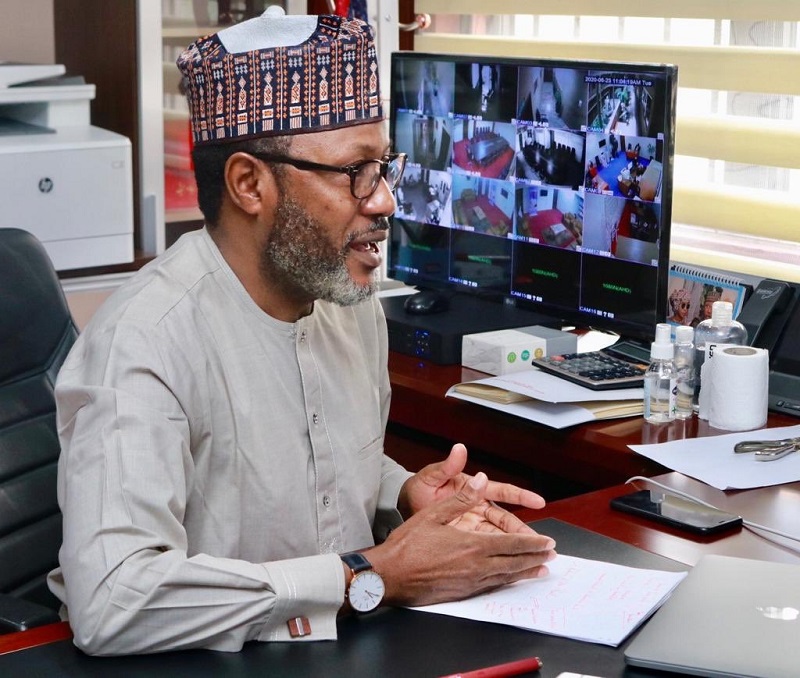News
Innovation in all sectors is crucial for economic diversification – Minister

The Minister of State for Science and Technology, Dr Mohammed Abdullahi, says the only option for Nigeria’s economic diversification to succeed is through the application of cutting edge innovations in all sectors of the economy.
Abdullahi made his view known at the opening ceremony of a two-day virtual Government-Industry-Academia (GIA) Linkage Workshop organised by the National Centre for Technology Management (NACETEM), on Wednesday in Abuja.
He stressed that to drive home President Muhammadu Buhari’s quest for economic diversification, innovation should be backed by research in agriculture, biotechnology, health, nano technology, as well as the other sectors.
The minister spoke on the topic: Fostering Technological Development Through Government-Industry-Academia (Triple Helix) Linkages in Nigeria.
“It is pertinent to emphasise that any nation that wants to diversify economically must put research and development agenda on the front burner of its developmental agenda.
“The challenges of all-round sustainable development faced by Nigeria and the long term character of research activities call for strategic approaches to research and innovation for diversification of the nation’s economy,” he said.
Abdullahi noted that Nigeria’s economy has been bedeviled with the inability to efficiently exploit its huge and abundant human and material resources for nation building.
He said that as a means to sustain the economy, Nigeria had so far relied heavily on its export of resources such as fossil fuel, cash crops and other unprocessed solid minerals.
“This has exposed the country to economic instability, occasioned by vagaries of the international commodities markets,” the minister said.
He said at such critical time in Nigeria’s history, the country would be better off by using locally developed technologies to solve the national problems and challenges.
He hinted that research and innovation could yield new technologies and products, generate solutions to existing challenges and boost global competitiveness of its goods and services.
The minister explained that this would only be achievable when research prototypes and outputs are pushed into commercialisation in an enabling environment.
“Evidence around the world proved that research and innovation are growth determinants which must work together to attain sustainable growth and development,” he said.
He recalled that so far, President Buhari’s administration had resolved to refocus on diversification of the economy by fully embracing Science, Technology and Innovation (STI), for national development.
He spoke on the current administration’s efforts in restoring economic growth by developing the Economic Recovery and Growth Plan (ERGP), a medium term plan for 2017 to 2020.
Abdullahi also mentioned the Nigeria Economic Sustainability Plan (NESP) which was approved by the Federal Executive Council in June 2020.
He said both plans recognised the need to leverage STI and build a viable research and innovation in harnessing the abundant natural resources Nigeria is endowed with.
He, however, expressed concerns that in the past three decades, the investment of the country has not been so significant compared to other developed nations.
“The country’s gross expenditure for research and development as a percentage of GDP is 0.2 per cent as against the minimum of one per cent of GDP proposed in Nigeria’s STI policy.
“It should be noted that the government announced at the Technology and Innovation Expo 2021 that 0.5 per cent of the GDP will now be allocated to research and innovation,” the Minister said.
He urged the National Agency for Science and Engineering Infrastructure (NASENI) and relevant agencies of the ministry to collaborate in industry-research to promote innovation for industrial development.
In his address of welcome, Prof. Okechukwu Ukwuoma, Director-General of NACETEM, said the workshop was a bold attempt by the organisation to bring together key actors in the Government, Industry and the Academia.
He disclosed that this was with a view to discussing practical ways of addressing the apparent disconnect among these key actors.
“Without doubt, synergy among the actors will bring about radical change in our approaches to deployment of science, technology and innovation to the achievement of sustainable development, particularly in Nigeria,” he said.
The NACETEM DG said that as a government agency, NACETEM was saddled with the responsibility of providing critical knowledge support in the area of the STI management.
Ukwuoma said they manage the STI through policy research, capacity building science, technology and innovation advisory services, databank of STI resources, among others.
He said organising a national workshop on Government-Industry-Academia Linkages was not just to “fulfill all righteousness.”
“It is a deliberate effort to link the thinkers with the doers in order to trigger a new consciousness that will birth socio-economic development in Nigeria.
“The need for collective effort to deliberately collaborate by government, industry and academia is a critical reason for this gathering,” Ukwuoma said.




 Davido's Net Worth & Lifestyle
Davido's Net Worth & Lifestyle 
